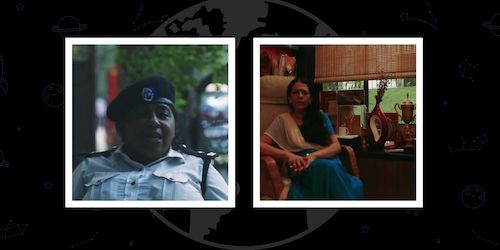This month audiences can screen 14 Year old Neel Menon’s film, Girls Should Stay At Home, on the Planet Classroom Network YouTube Channel. The film recently won best documentary for film at the San Diego International Kids Film Festival. The documentary follows three resilient Indian women – Geeta Chauhan, Rajani Pandit, and Anita Lobo – who pursue their passions as a paralegic basketball player, a female detective in a country where licensed detectives are nonexistent, and a traffic warden managing busy streets with minimal help. They each share their journeys and perspectives as individuals who have leaped countless barriers in a country that is systematically oppressive to women.
Neel, how did you find and select the women featured in your film? Why did you choose to tell their stories in particular?
Prior to this, I hadn’t heard of any of these women. The process of research took about a month or so. It started with reading websites, articles and magazines that told the stories of important, influential, strong women. I had eventually created a list of 7 stories that I could explore, but something appealed to me very much about the 3 stories that were finally picked. In the case of Ms. Rajani Pandit, her story was one filled with crime and action, which I knew would keep the viewer engaged, and would also let us explore a very interesting character. With Ms. Anita Lobo, I found the fact that she does her work voluntarily with no pay very interesting, because it came from a genuine need and desire to help the state of Mumbai and Bandra. And of course, with Ms. Geeta Chauhan, she was facing difficulty not only due to her gender, but also due to her disability, and she still had the perseverance and courage to work hard every day to achieve her goals.
Did you always intend for the film to take such a positive and uplifting tone or did working with the women lead you in that direction?
The purpose of the film was always empowerment and inspiration as opposed to victimhood. I wanted to introduce an uplifting feeling to the viewer, instead of them feeling bad for the subjects in the film.
Each woman has a very different story. What did you hope to achieve by putting them alongside each other?
The purpose of aligning distinct stories and distinct hardships was to show that perseverance and tenacity through hard times can exist in situations of all economic classes and professions. When you watch the film, especially the end section, where the quotes from each of the subjects are cut together, it is easy for the viewer to draw parallels between their situations, and the advice that they give to other women is common among the three of them: Don’t give up, keep fighting.
Which women in your life have inspired you growing up and why?
My mom is one of my biggest inspirations in a lot of my decisions, actions and the way I handle relationships. She often has the best advice in tough situations with enough encouragement to lift my spirits, but enough realism so that I am not blind.
C.M. Rubin and Neel Menon
Don’t Miss Neel Menon’s film, Girls Should Stay At Home (curated by LXL Ideas), on the Planet Classroom Network YouTube Channel.







Recent Comments